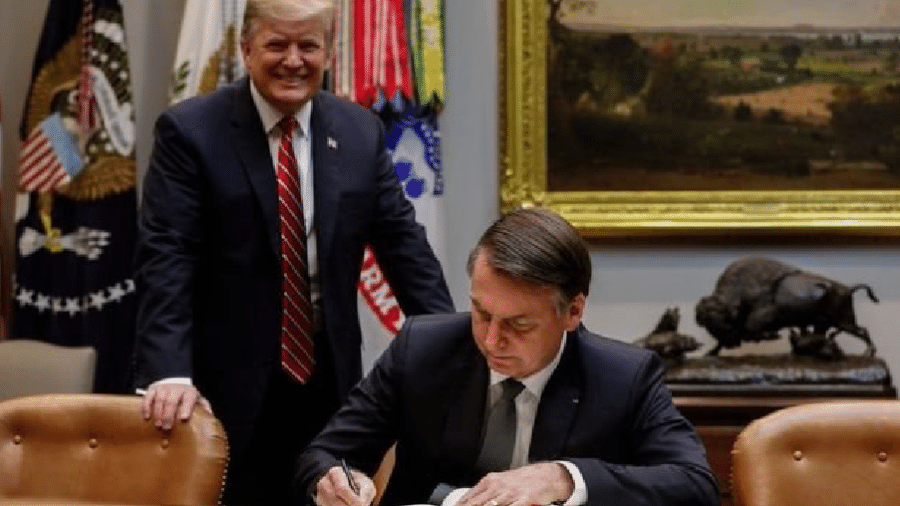
Jair Bolsonaro’s salute to the American flag in May of last year was not a fairy tale, but an omen.
In an attempt to help Donald Trump get reelected, Jair Bolsanaro, who is unaffiliated with any party, showed that his loyalty to the president of the United States might outweigh his concern for the interests of our economy.
The problem is that a government that willingly surrenders to being a servant to another can never complain if it is not treated with due respect. Still, support exists.
At a bilateral cooperation event on Oct. 19, Secretary of State Mike Pompeo felt free to publicly suggest that Brazil move away from China commercially, our biggest trading partner.
On Sept. 18 in Boa Vista, Roraima (a Brazilian state bordering Venezuela), a meeting with Ernesto Araújo served as a platform for Pompeo to provoke Venezuela, which led the Brazilian Senate opposition to summon the chancellor to explain himself for helping to create an issue for Trump’s reelection campaign.
Last month, in the middle of the final stretch of the U.S. presidential campaign when Trump needed to reinforce the fact that he had allies in the dispute against the Asian giant, Brazil signaled that it intends to exclude or limit the participation of Chinese Huawei in the selection of the country’s 5G system.
(Meanwhile, Bolsonaro’s staunchest supporters promoted the conspiracy theory that a Chinese COVID-19 vaccine would inject people with nanochips in order to monitor and control people through Huawei’s 5G network.)
In order to help Trump, who is seeking votes in corn-producing states (raw material for ethanol in the U.S.), Bolsonaro made life difficult for Brazilian ethanol producers, who have stock to spend due to reduced pandemic consumption. Bolsonaro renewed the quota of ethanol the U.S. can import in without paying import taxes to 62.5 million liters per month (approximately 16.5 million gallons); above this amount, the tax is a common MERCOSUR tariff of 20%. (The quota expired in August.)
This comes after the United States reduced the quota of semifinished steel that Brazil can sell them without tariffs. The total fourth-quarter quota dropped from 350,000 tons to 60,000 tons this year. U.S. industries also put pressure on Trump as he seeks reelection to reduce imports due to falling demand as a result of the pandemic.
The issue at stake here is not free trade. You can be in favor of Brazil and the United States having a buy and sell relationship without tariffs for various products, as happened with ethanol until the U.S. increased the total amount exported to Brazil. The issue is, everything sounds too subservient.
Bolsonaro fears that Trump will be defeated and Democrat Joe Biden will replace him, weakening Bolsonaro’s position and his own reelection chances. Therefore, he has agreed to do whatever is necessary, including delivering to America what was beyond its reach, overriding Brazilian interests and future promises. Promises that could resemble those that have remained on paper during two years of “partnership” between the two presidents.
In his reelection campaign, Trump has even used Bolsonaro’s government as a negative example in the fight against COVID-19, saying that the situation in the United States could have been bad like Brazil if he had not acted correctly. Considering that the U.S. is the global champion when it comes to the number of deaths from the disease (232,000), while Brazil is in second place (160,000), this is supremely humiliating.
Our president was inspired by Trump’s propaganda promoting hydroxychloroquine as a life saving elixir and a way to avoid the disease. The point is that, at a certain point, Trump made took some rational action because he realized that the tens of thousands of COVID-19 deaths would weigh on Tuesday’s election. And when Trump became ill, even he didn’t claim to have used the medicine he was preaching about, medicine that has no proven effectiveness for treating COVID.
As I’ve said, the current administration of the Ministry of Foreign Affairs has abandoned a tradition of more than a century of independent diplomacy for the sake of crumbs that fall from a friend’s table; an imaginary friend, of course.

Leave a Reply
You must be logged in to post a comment.